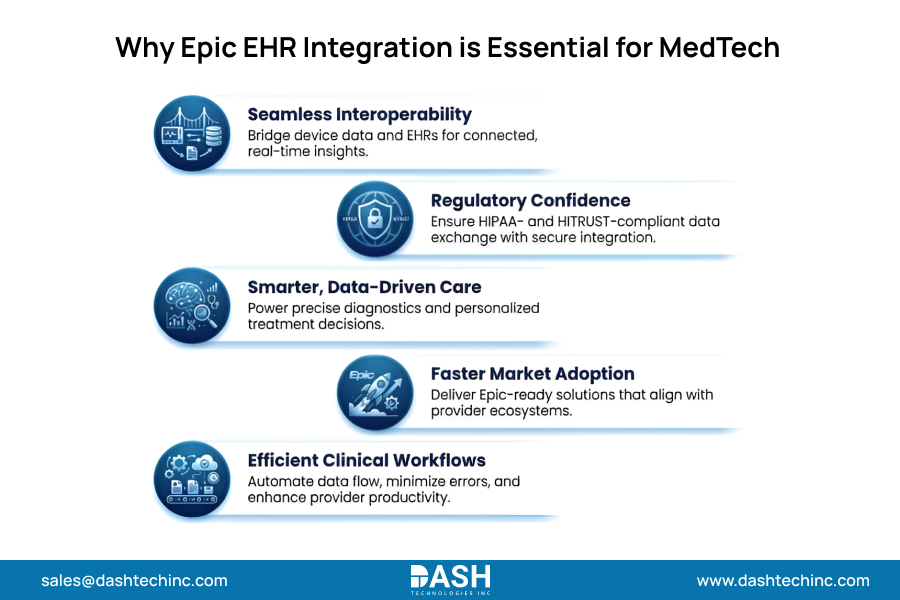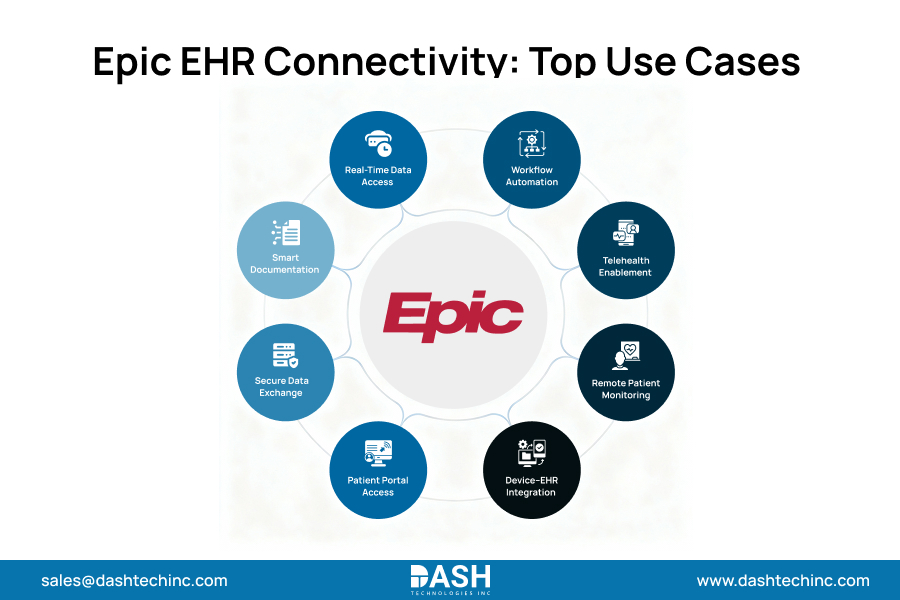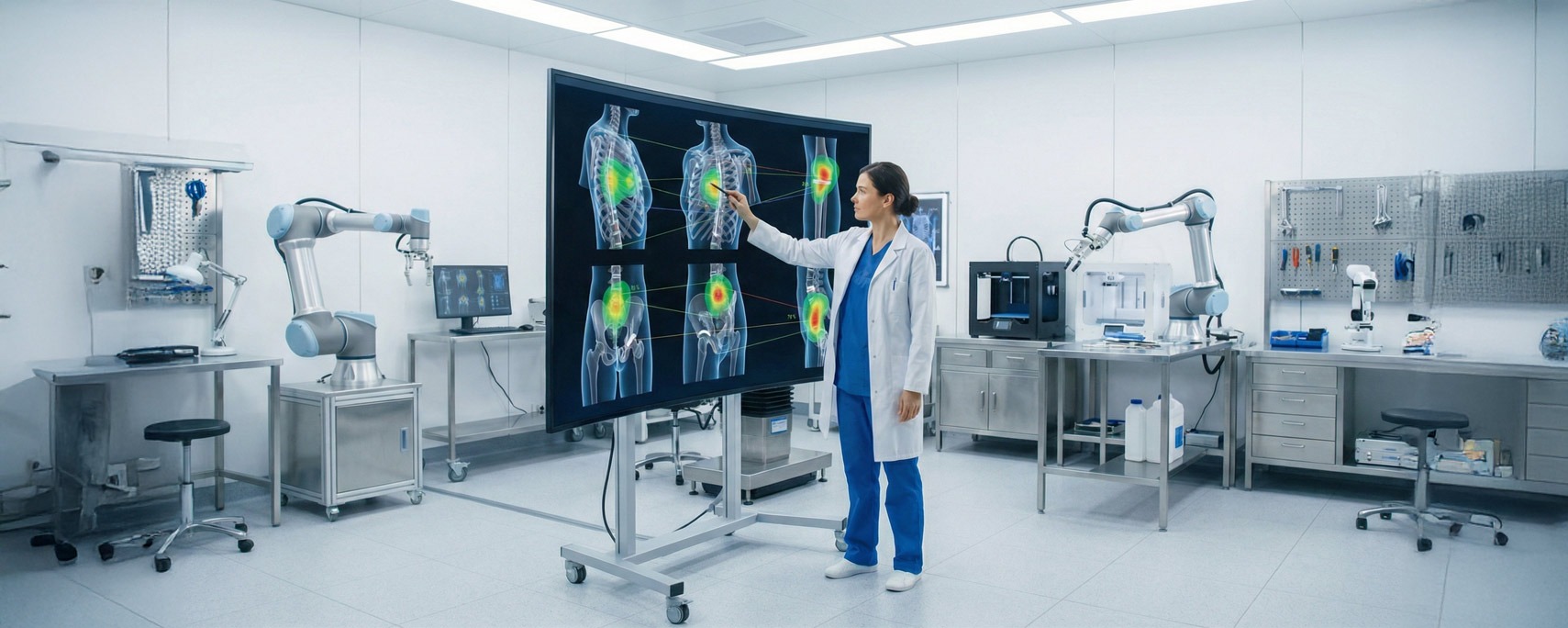Why MedTech Companies Need Epic EHR Integration?
Introduction
Epic EHR integration is essential for MedTech companies to boost system compatibility and improve healthcare processes. In a complex medical network, seamless data exchange with Epic is no longer optional; it’s a necessity. MedTech companies integrating with Epic can enhance equipment synchronization, optimize data usage, and drive adoption.
Let’s further discuss how Epic has transformed the outlook of the healthcare industry and why MedTech leaders can’t ignore the value Epic ecosystem offers.
Overview of Epic EHR and Its Integration Capabilities
Epic is a leader in Electronic Health Records (EHR), supporting hospitals, specialty clinics, and independent practices. It optimizes clinical workflows, expands access to patient data, and strengthens communication across healthcare systems.
A key strength of Epic is its focus on system compatibility. Through the use of interoperability standards like HL7 and FHIR, EHR integration with Epic enables seamless data exchange between healthcare applications, enhancing care coordination, and minimizing redundancy.
Regulatory adherence and data protection are also integral to Epic’s approach. The platform meets HITRUST certification standards and complies with HIPAA, ensuring the protection of sensitive medical records.
Many organizations work with Epic EHR integration partners to tailor workflows, integrate third-party apps, and improve system performance. These partnerships help healthcare providers maximize Epic’s capabilities, leading to better patient outcomes.
Thinking About Epic EHR Integration?
Let’s explore how secure, scalable Epic connectivity can strengthen your product, data flow, and clinical workflows.
Book a Free ConsultationEpic’s Role in EHR Integration: Key Market Statistics
- Epic reports supporting healthcare organizations in 16 countries, with over 3,700 hospitals using their systems.
- This Week Health estimates that Epic handles more than 305 million patient records, making it the largest EHR network.
- Healthcare IT News reports that in 2021, Epic’s growth in market share surpassed all other vendors, with the company holding 32.9% of the acute care hospital market. This helps reinforce its dominance as a trusted Epic EHR integration company.
- Market.us Media indicates that over 95% of hospitals in the United States have adopted EHR systems, with Epic being a major contributor to this widespread adoption and advancing Epic device integration capabilities.
- Fierce Healthcare reports that Epic and Cerner now control more than 50% of the acute care market, with Epic leading.
Why Epic EHR Integration is Vital for MedTech Companies

- Seamless Interoperability for Connected Healthcare
Medical devices generate vital diagnostic details, enabled by Epic API integration services that streamline connectivity and data flow. Without integration, this data remains isolated. Epic EHR integration enables direct data exchange across healthcare systems, providing immediate access to patient vitals, diagnostics, and medical history. This supports clinical decision-making and improves patient care. - Regulatory Compliance and Data Security
Strict regulations governing healthcare data management and security. Integration with Epic helps MedTech companies adhere to HIPAA and HITRUST standards, mitigating legal risks and ensuring secure patient data management by working with Epic EHR integration partners. - Data-Driven Care: Improved Patient Outcomes
Integrated systems provide live information, help with personalized treatment planning and early disease detection. MedTech companies enhance diagnostic accuracy by integrating with Epic, leading to timely interventions and better patient care. - Increase Market Adoption
Hospitals and healthcare providers to provide solutions that fit within their existing EHR systems. MedTech companies that integrate with Epic or collaborate with an Epic integration partner for medical devices gain a competitive advantage, making their products more attractive to care providers. This boosts adoption rates and strengthens their market position. - Optimized Clinical Workflow Efficiency
Manual data entry into EHR systems slows down healthcare providers and raises the risk of errors. Epic integration automates this process, reducing administrative tasks and lowering mistakes. This leads to improved productivity and better patient care.
Key Applications of Epic EHR Connectivity for MedTech

- Streamlined Clinical Workflows and Real-Time Data Access
Epic EHR integration, powered by Epic API integration services, allows for efficient data exchange between healthcare systems, providing access to patient records in real time. This enhances decision-making and minimizes errors. Secure data sharing ensures that hospitals, clinics, and healthcare professionals stay connected. - Automated Processes for Operational Efficiency
Epic integrates with MedTech devices and administrative systems to handle routine tasks such as documentation, billing, and regulatory reporting, supported by Epic integration company solutions. By reducing paper-based entry, automation decreases errors and improves hospital efficiency. - Advanced Telemedicine and Remote Patient Monitoring
Epic integration supports virtual care by giving providers access to complete patient histories during telehealth visits. It also connects with wearable devices and home monitoring systems, tracking vital signs, and instantly detecting health risks. Many clinical networks work with Epic EHR integration partners to enhance these connections, ensuring seamless data flow and stronger patient monitoring. - Seamless MedTech Device Connectivity
Imaging systems, infusion pumps, and diagnostic tools connect directly with Epic, automating data entry into patient records through Epic device integration. This improves clinical workflows and encourages device adoption among healthcare providers. - Improved Patient Engagement and Access to Health Information
Epic’s MyChart and other patient portals help individuals manage their health. These tools provide access to medical records, enable appointment scheduling, and support direct communication with providers. This encourages patient participation in their care.
Key Benefits of EHR Integration with Epic
Holistic Population Health Management
Epic integration helps medical institutions gather and analyze patient health records from various sources in collaboration with Epic EHR integration partners. It helps identify health trends, detect diseases early, and manage chronic conditions such as diabetes and heart disease. Hospitals and clinics can work with Epic integration partners to develop tailored data-sharing solutions that track patient health over time.
Public health agencies also monitor outbreaks and provide resources where needed using Epic. This approach uses data to improve healthcare planning, leading to enhanced treatment quality and fewer hospital visits.
Faster Research and Clinical Trials
Access to reliable clinical data is necessary for medical research and clinical trials. Using Epic API integration services, researchers can identify eligible participants without delay, monitor treatment results, and analyze real-world health data. This accelerates trial recruitment and ensures studies rely on accurate information.
Many research institutions connect outside research tools to Epic. This makes gathering and analyzing data easier. Better access to health records helps advance treatments. This also enhances patient safety. Additionally, it speeds up the entry of medical advances into the healthcare industry.
Efficient Multi-Specialty Collaboration
Patients often receive care from multiple specialists, including cardiologists, oncologists, and primary care physicians. Epic integration enables healthcare teams to share treatment history efficiently, minimizing duplicate tests and improving coordination.
Many healthcare systems use Epic integration partners, including an Epic integration partner for medical devices, to connect Epic with specialty systems. This allows medical professionals to access the required data without disrupting workflows. The result is improved communication, faster decision-making, and more effective treatment strategies that promote timely and coordinated patient care.
Why DASH Technologies Is the Right Partner for Epic EHR Integration
DASH Technologies is a trusted Epic EHR integration company delivering thorough integration solutions that ensure seamless data exchange across healthcare systems. Our expertise in Epic API integration services, HIE, interoperability, and cloud-based integrations enables healthcare providers and MedTech companies to streamline workflows, enhance patient care, and maintain regulatory compliance.
Key Areas Where DASH Technologies Delivers Value:
- HIE & Interoperability: We make HIE solutions with easy connectivity among health systems.
- On-Premises & Cloud-Based Integrations: We design scalable integration architectures that support both on-premises and cloud infrastructures while aligning with Epic API integration services for secure, real-time data flow.
- Seamless Data Exchange: Our integrations support HL7, FHIR, and DICOM standards for live data sharing.
- Real-time patient records: We make critical information instantly accessible for timely clinical decisions, supporting healthcare providers and MedTech innovators working with an Epic integration partner for medical devices.
DASH Technologies delivers secure, scalable, and future-ready healthcare integrations. As a dedicated Epic EHR integration company, we empower organizations to amplify connectivity, enhance interoperability, and improve care outcomes. Connect with us to amplify connectivity and improve care.
About Dash

Dash Technologies Inc.
We’re technology experts with a passion for bringing concepts to life. By leveraging a unique, consultative process and an agile development approach, we translate business challenges into technology solutions Get in touch.







